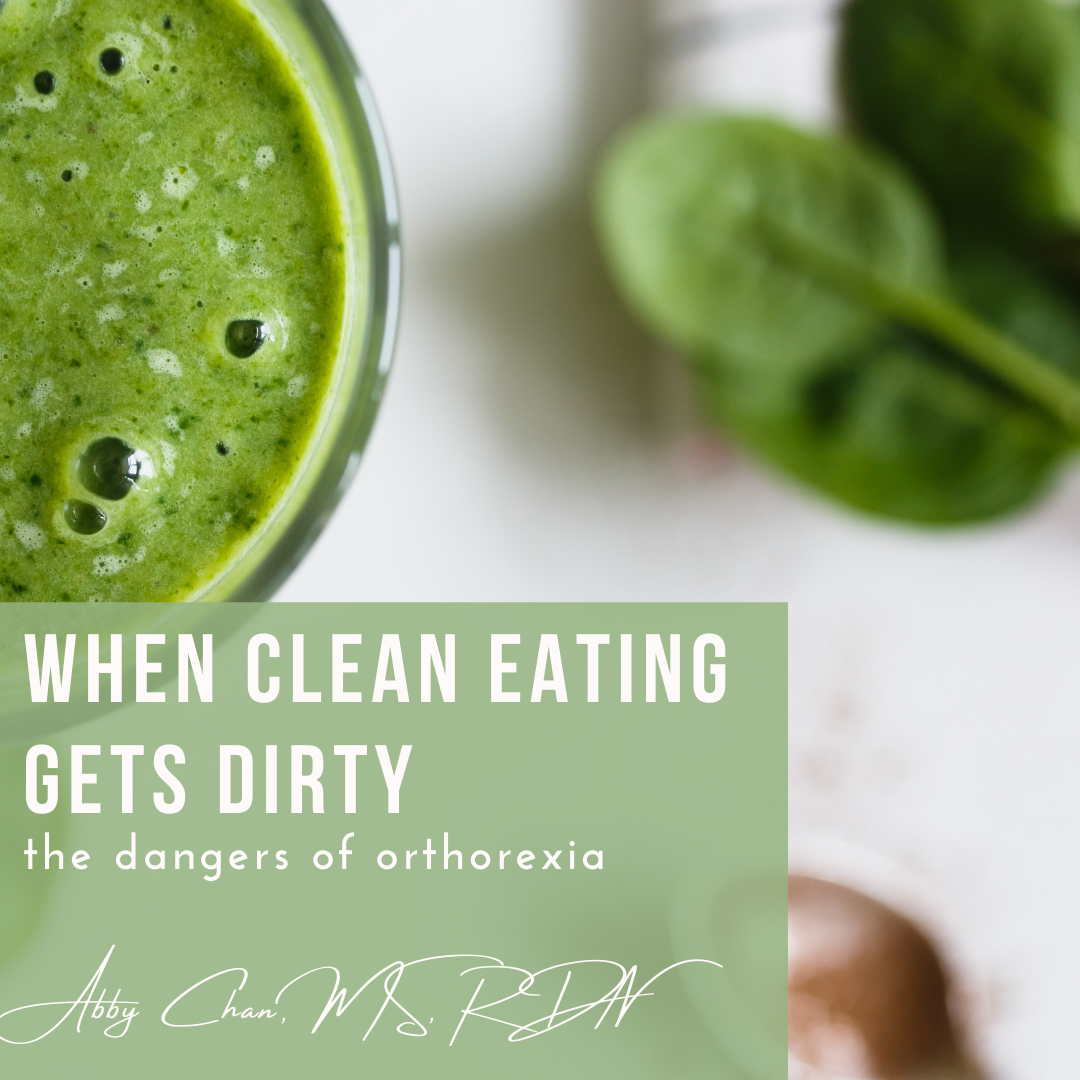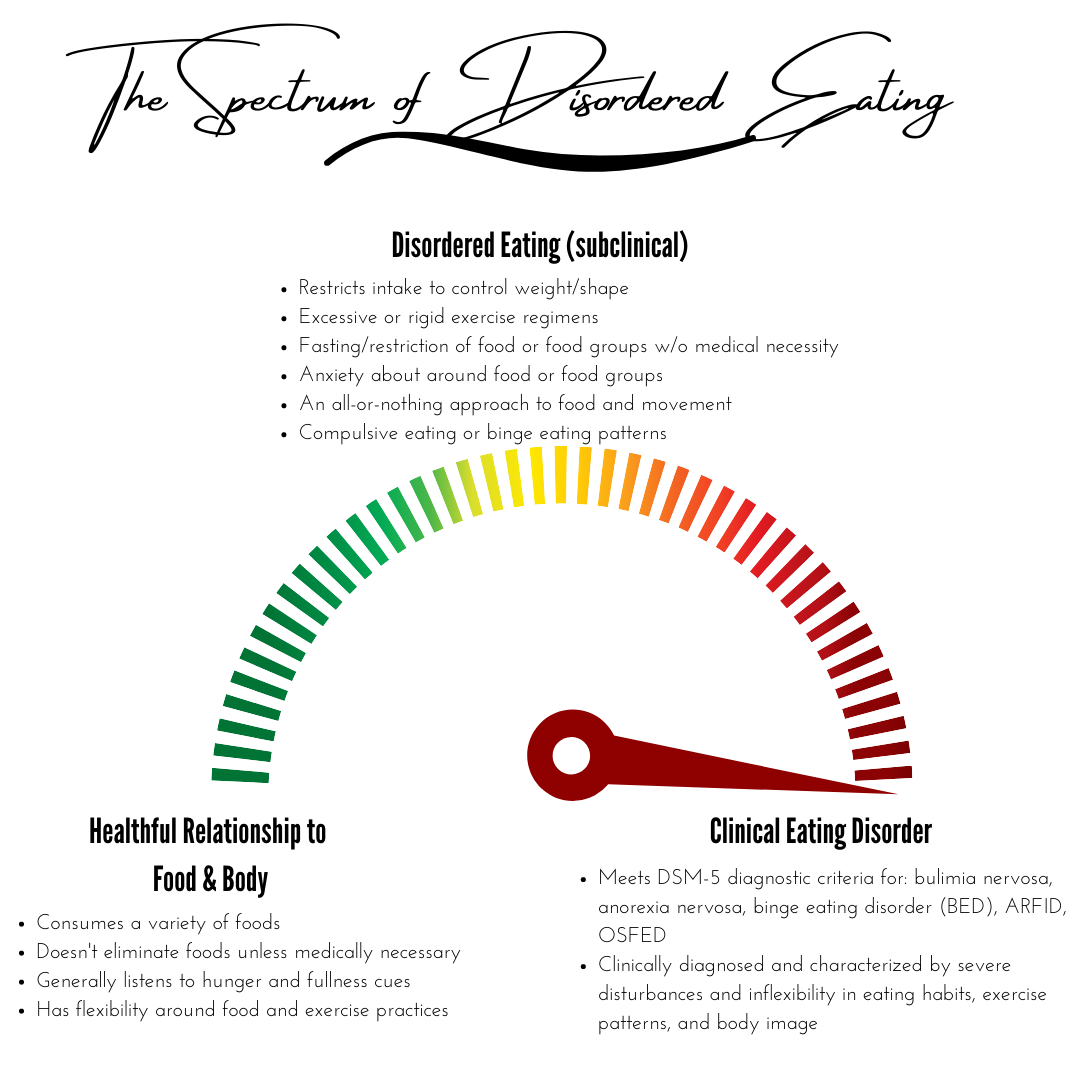When “Healthy” Goes Too Far: Understanding Orthorexia
Let’s begin with a little game of association here. When you hear the word healthy, what comes to mind?
Images or phrases such as gluten-free, juice cleanse, abs, dairy-free, paleo, keto, whole30, dewy skin, and ________ [insert any other #trendingnow idea] may have come to mind. As you can see, the term healthy is pretty loaded these days.
Over the last decade, we have seen increased interest in nutrition, wellness, and fitness—which is great, don’t get me wrong. I love that people are considering how food affects their well-being and how it impacts their daily lives.
But is there such a thing as being too healthy?
Yes. Yes, there is.
This is where Diet Culture comes in. It’s a culture of dieting, cleansing, clean eating, detoxing, macro-counting, managing, and eliminating food. It’s rooted in the idea that you should change your body to meet society’s “norms.” None of these concepts are new; they’re just re-washed, re-mixed versions of disordered eating. The “low-carb” diet was introduced in the mid-1800s, and the government’s first recommendations on protein, carb, and fat balance came in the early 1900s. In our age of instant gratification and social media, these ideas have hijacked our lives, our bodies, and our relationships with food. Diet culture isn’t something we opt into—it’s something we’re born into. It’s passed down through generations, through how caregivers talk about food and their bodies, and in the ways society praises thinness, weight loss, and visible muscle as markers of morality.
But food is so much more than fuel. It is our comfort, culture, connection, joy, and—yes, energy and nutrients. Think about your mom’s cookies (or any favorite childhood food). What memories come up? Coming home from school, Christmas, or a birthday? These emotions are deep-rooted. Diet Culture doesn’t just tell us to eat cookies less often—it tells us cookies are “dirty,” “scandalous,” worthy of guilt and shame. That’s simply untrue.
Our culture’s obsession with “detoxing,” “cleansing,” and “clean eating” has warped our relationship with food and our bodies—and it’s a serious concern.
So what is orthorexia?
Orthorexia is a fixation on righteous eating. It is not yet recognized as a clinical eating disorder in the DSM-5 (Diagnostic and Statistical Manual of Mental Disorders), but it is seriously disordered, and any level of disordered eating is a problem. Eating disorders such as anorexia nervosa, or buimia nervosa, have specific criteria that must be met to be diagnosed. But just because you don’t meet these criteria, that doesn’t mean that you have a healthy relationship with food.
Orthorexia is the extreme of “healthy” eating. It is when your food choices start impacting your normal life and ability to adapt to your environment and circumstances. I see orthorexic tendencies start when someone decides to eliminate a group of foods for either “health” or “environmental” reasons. This may start with decreasing their sugar intake or eating more fruits and vegetables. Neither of these is inherently bad, but this process can lead to a hyper-vigilant attitude towards food and ingredients. For most people, things stop there. But for others, the elimination spiral continues in a way that becomes problematic.
Instead of restricting food quantity like other eating disorders, orthorexia is overly restricting food due to quality or emphasizing food morality, such as “good” foods vs “bad” foods. Here are some of the signs and symptoms:
Rigidity: Sure, we all have our quirks. I don’t eat candy daily, but that doesn’t mean I won’t get down on some Skittles or Hi-Chews now and again. However, someone who has orthorexic tendencies will avoid “bad” foods at all costs and experieence stress, guilt, or shame when encountering them.
Ask yourself this: Do you avoid eating out or choose to go hungry in social situations because you may not know what is in the food that is offered, or where it comes from?
Fixation on quality: Yes, food quality matters. But, refusing to eat food when you’re hungry, unless it’s organic, raw, dye-free, or whole, is problematic.
Ask yourself this: Would you eat something if you didn’t know how it was grown, how it was prepared, or where it came from?
Eliminating entire food groups: Orthorexia may start with going vegetarian, then vegan, and then raw vegan. Then, you eliminate gluten because you read in Women’s Health that it is the devil incarnate. Sugar is next because it’s “addictive,” right? Then, you eliminate nuts because, well, lectins. White foods? No thanks. Then it’s the carbs because those are probably causing every ache and pain. And then *POOF* all of a sudden you don’t have anything left to eat and you have eliminated so many foods from your diet that you are malnourished, tired, and fatigued. When in reality, this is actually why you’re tired, feel bloated, and have pain. Because you’re not eating enough. The most inflammatory thing we can do to our body is not provide it with adequate calories and nutrients.
I want to take a moment to note that I am not talking about those who eliminate food due to religious reasons or because of a diagnosed medical condition, such as celiac disease.
Ask yourself this: Are there things that I have eliminated a rule or a preference? A rule would be something that someone else has decided for you (a diet, cleanse, magazine, influencer, protocol, etc). A preference would be something that you don’t eat because you prefer not to. You can easily prefer not to eat cheese, but if you don’t eat cheese because someone has told you that it is “addictive” and inflammatory, it’s a rule.
Emotional turmoil: Individuals with orthorexia will often have a heightened emotional response when they are confronted with eating something out of their control or out of their norm. These feelings may include anxiety, guilt, or distress. It may require a lot of unlearning and dismantling to get to the bottom of these emotions to better understand why they’re coming up. The best way to do that is with a mental health professional and a Registered Dietitian. Simply eliminating foods is not the answer.
Ask yourself this: Do I feel overly guilty or anxious when I eat something out of the norm?
Identity tied to food: Orthorexia is often motivated by health, family health history, health scares, control, avoidance of fears, improving self-esteem, or searching for spirituality through food. With orthorexia, someone’s eliminations become central to their identity: “I’m keto”, “I’m Gluten-Free”. Although orthorexia is not always associated with body image, it has recently started shape-shifting due to wellness influencers promising that eating a certain way will result in glowing skin, flat abs, and toned bodies.
Ask yourself this: If I were to write a bio, would I add vegan 🌱, WFPB (whole food, plant-based), or any other food-related descriptor?
If you answered “yes” to any of these questions, I would urge you to get curious about your relationship with food and discuss these thoughts with a Registered Dietitian or mental health counselor.
Why it’s good to be dirty
“Clean eating” sounds nice—who doesn’t want to be clean? But by default, if food is “clean,” then anything outside of those rules must be “dirty”. This is where the problem lies. Is dirty the best way to explain your mom’s cookies? No.
Food isn’t moral. Cookies aren’t bad. Kale isn’t good. They’re just food. Just as many things in our lives are not binary, neither is food.
A truly healthy relationship with food isn’t about restriction—it’s about:
Eating when you’re hungry (and sometimes when you’re not—hello, stress and anxiety).
Eating in community.
Finding joy in food.
Allowing flexibility.
Choosing a variety of foods that support both physical and mental well-being.
The best way to “eat clean”? Wash your produce. Cook your food properly. Beyond that, it’s about finding balance, joy, and sustainability—not living inside boxes of yes/no, good/bad.
I believe that everyone should find a way of eating that aligns with their ethics, lifestyle, and brings them joy rather than subscribing to some abstract idea of “eating clean”. The best way to eat clean is to wash your produce and cook your food to the proper temperature to kill any harmful bacteria.
Concerned or confused about food? We’re here to help. Click the button below to schedule a FREE 15-minute strategy session with our Registered Dietitian to develop a plan to meet your goals.


